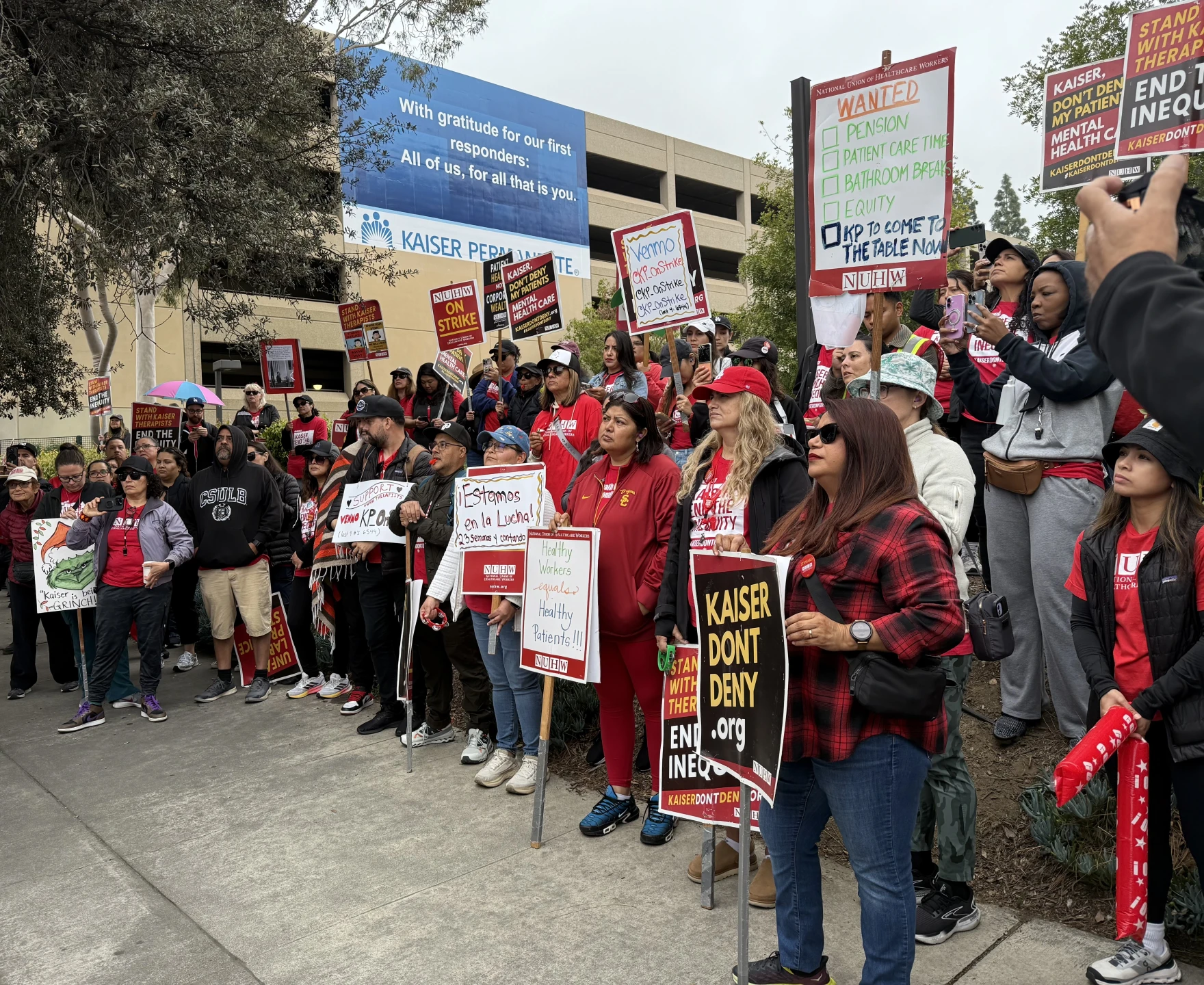California regulators released a report this week highlighting that Kaiser Permanente has yet to fix several longstanding deficiencies in its behavioral health care services, despite being cited years ago.
The report from the California Department of Managed Healthcare (DMHC) outlines 20 deficiencies initially identified in 2022, ranging from failing to provide non-urgent mental health and substance-use appointments within 10 days to not ensuring that members are offered urgent care appointments within 48 hours of a request. The report states that Kaiser has still not corrected 19 of them.
The findings come as Kaiser mental health workers in Southern California continue their strike, now entering its sixth month, against the health care provider.
Ongoing Strike by Kaiser Mental Health Workers
The strike involves approximately 2,400 therapists, psychiatric nurses, psychologists, and social workers represented by the National Union of Healthcare Workers (NUHW). These workers are advocating for better pay, pensions, and more time for patient follow-ups.
Sal Rosselli, president emeritus of NUHW, stated, “This report shows why Kaiser Permanente mental health workers remain on strike. Kaiser keeps saying everything is fine when its workers know that patients can’t get the care they need because Kaiser’s services are understaffed and underfunded.”
Kaiser Permanente responded to the report by stating it has made “substantial progress” in addressing these issues and continues working to transform its behavioral health program.
Deficiencies Identified by the State Regulators
The latest DMHC report follows a $50 million fine imposed on Kaiser last year for failing to provide timely mental health care. As part of a settlement, Kaiser agreed to invest an additional $150 million over five years to improve behavioral health services.
According to the DMHC, issues still persist, including:
- Failing to offer non-urgent mental health and substance-use appointments within 10 days of an initial request.
- Not ensuring enrollees receive urgent care appointments within 48 hours.
- Lack of adequate oversight of suicide risk screenings.
“Health plans are required to provide their members with appropriate access to behavioral health care services, and the DMHC will continue to hold Kaiser Permanente accountable to these requirements in the law,” said DMHC Director Mary Watanabe.
As part of the $200 million settlement agreement, Kaiser is required to implement a corrective action plan. The DMHC will conduct a follow-up survey within 18 months to assess Kaiser’s progress.
Governor Newsom Urges Mediation as Strike Continues
California Governor Gavin Newsom has urged both Kaiser Permanente and NUHW to settle the strike through mediation, particularly in light of the devastation caused by the January wildfires in Los Angeles County. Newsom emphasized that Southern California residents are “grappling with extreme loss and displacement” and that resolving the dispute is crucial to ensuring mental health care access.
Earlier this month, former California Secretary of Health and Human Services Mark Ghaly and former Sacramento Mayor Darrell Steinberg were appointed as mediators. However, negotiations have stalled, according to the union.
Kaiser Employees Protest in Pasadena
On Wednesday, more than 100 Kaiser employees and supporters rallied outside the health provider’s Pasadena offices. Protesters held signs reading “Healthy workers equal healthy patients” and “End the inequity.”
Patricia Arevalo-Porcelli, a licensed clinical psychologist and longtime Kaiser employee, shared that some of her patients have even joined the picket lines in support of striking workers.
“The need for us to get back and be of service to the community who is truly grieving, deeply, is now more than ever,” she said, noting that some mental health workers have also lost their homes in the Eaton Fire.
Frequently Asked Questions (FAQ)
What is Kaiser Permanente being cited for?
Kaiser has been cited for failing to provide timely access to behavioral health care, including long wait times for non-urgent and urgent mental health appointments, as well as inadequate oversight of suicide risk screenings.
Why are Kaiser mental health workers on strike?
Approximately 2,400 therapists, psychiatric nurses, psychologists, and social workers are striking for better pay, pensions, and more time for patient follow-ups. They argue that understaffing is preventing patients from receiving the care they need.
What action has California taken against Kaiser Permanente?
In 2023, California fined Kaiser $50 million for its failures in behavioral health services. Kaiser also agreed to invest $150 million over five years to improve mental health care. Regulators will conduct a follow-up survey within 18 months to monitor compliance.
How is Kaiser Permanente responding to the strike and citations?
Kaiser claims it has made “substantial progress” in improving its behavioral health program. It also states that 60% of union-represented employees have continued working or returned, and it has an outside network of over 13,000 providers.
What role is Governor Gavin Newsom playing in resolving the strike?
Governor Newsom has urged both parties to reach an agreement through mediation, especially in light of the recent wildfires in Southern California. However, negotiations remain stalled.
What happens next?
Kaiser is required to follow a corrective action plan as part of a $200 million settlement agreement. State regulators will conduct a follow-up review within 18 months to determine if the issues have been addressed.











Leave a Reply